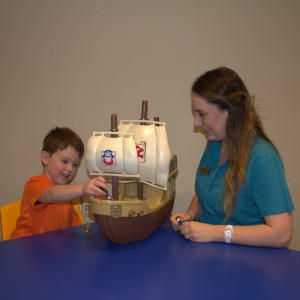 Pretend play becomes more complex as children develop. By four to five years children are beginning to act out a series of actions to form whole scenes. They also begin to explore topics outside of their daily experience, such as the fire station, zoo or beach and fantasy themes such fairies, pirates and dinosaurs. Why is pretending so important for development?
Pretend play becomes more complex as children develop. By four to five years children are beginning to act out a series of actions to form whole scenes. They also begin to explore topics outside of their daily experience, such as the fire station, zoo or beach and fantasy themes such fairies, pirates and dinosaurs. Why is pretending so important for development?
Pretend play involves many skills including emotions, thinking, language, the senses and movement and so it is thought that it helps to build links between the different parts of the brain responsible for different functions.
Pretend play involves understanding other people. Pretending to be another person whether it is mum or dad, a baby or a ballerina, a princess or a pirate involves thinking about another person's role, how they feel and act and how they see the world. This develops a child's theory of mind. Theory of mind is a higher level thinking skill important for learning and social development which can be challenging for children with special needs to develop.
Pretend play helps to develop story telling skills which are important in the development of literacy skills. In acting out pretend scenarios children become a character which performs a series of actions to achieve a goal or solve a problem. This is just what happens when we tell a story.
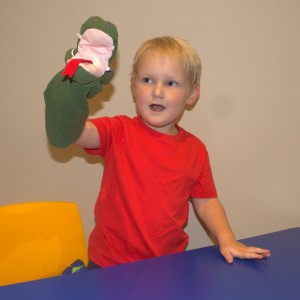 Pretend play allows opportunities to develop social language, higher level thinking and social skills. When children play together they learn to negotiate, explain, share, take turns, problem solve and respond to the comments, actions and emotions of others.
Pretend play allows opportunities to develop social language, higher level thinking and social skills. When children play together they learn to negotiate, explain, share, take turns, problem solve and respond to the comments, actions and emotions of others.
Pretend play allows children to work through their emotions and deal with any stresses they may feel. A child who finds the day challenging can feel powerful and in control when pretending to be a superhero or a lion tamer. A child who feels lonely and isolated can feel a sense of belonging when playing families.
To help your child develop more complex pretend play skills:
Allow time for pretend play. As parents and educators we are concerned that our children learn the things that are seen as important for schooling such as letters, colours, shapes and numbers so it is tempting for playtime to become "teaching time". Allowing children to play freely is also important. Screen time takes up more and more of a child's day so make a regular time to turn off the TV, iPad and computer and allow your child to play.
Allow space for pretend play. Play can be messy. It also take longer to save the world from invading dragons than to do a jigsaw puzzle. Try to find a place where your child can play for a longer period without being in the way of adults or needing to pack up too soon. If you have the space for your child to set up a pretend world and return to it later more complex play can develop.
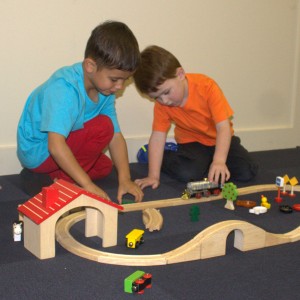 Provide partners for play. Your child can benefit greatly from time to play alone but pretending with others allows lots more opportunities and challenges for language, thinking and socialising. By finding time to play with your child you can have fun together, extend their skills and develop your relationship. By finding other children to join in the play your child can learn valuable social skills and build friendships.
Provide partners for play. Your child can benefit greatly from time to play alone but pretending with others allows lots more opportunities and challenges for language, thinking and socialising. By finding time to play with your child you can have fun together, extend their skills and develop your relationship. By finding other children to join in the play your child can learn valuable social skills and build friendships.
Provide materials for pretend play. Pretend play toys can be inexpensive. You don't need to buy the worlds best cubby house or a ride on motorised sports car. A cardboard box can be both a cubby and a sports car for free and tomorrow it can be something else.
Some simple things worth collecting for your child include:
- Toys for role playing such as cooking sets, tea sets, shopping sets, pretend tools. Cheap plastic sets work fine as do real items from the kitchen or opp shop.
- Props for dressing up. These can include old adult clothes, hats, shoes, handbags. Cheap shops have pretend costumes, hats, masks and jewellery at good prices.
- Characters such as dolls, teddies, stuffed toys and puppets to play roles when your child needs someone extra to play.
- Toys to create mini worlds, such as plastic animals, toy cars, train sets, dinosaurs, dolls houses.
- Items to extend play. Adding play dough to a tea set, blocks to farm animals, sand or gravel to trucks or dinosaurs can allow many more possibilities.
- Favourite themes. Have a box to collect items around your child's favourite theme. If your child loves pirates collect things such as an eye patch, sword, stuffed parrot, pirate hat, flag (old pillowcase), boxes for treasure, maps, a telescope (cardboard tube covered with foil), jewellery and coins for treasure.
- Collect items that can be many things. An old pillowcase can be a rug for a picnic, a cape for a superhero, a blanket for a doll, a curtain for a puppet show, a flag for a pirate ship, a rabbit holder for a magic show and many other things your child will dream up.
Ways to extend your child's play:
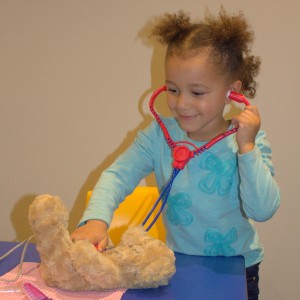 Think about new words and concepts your child can learn while playing with a theme. Include lots of specific nouns and verbs related to the theme and include describing words as well.
Think about new words and concepts your child can learn while playing with a theme. Include lots of specific nouns and verbs related to the theme and include describing words as well.
Encourage your child to use dialogue to speak like a character and to speak to their pretend characters as they play. Talk about their play afterwards and help them share their ideas with others.
Borrow a story book or a non-fiction book about your theme from the library to learn more.
Take photos of your child playing and use them to develop a storybook or slide show, or video your children acting out a scene to make a book or movie to show family members. There are some great journal apps where kids can use photos and record their voice to make a story book.
Collect a basic set of props and you can keep these in a box, play with them time and time again, add to them and reuse them in different ways as your child grows and develops.
Here are some fun ideas for pretend play:
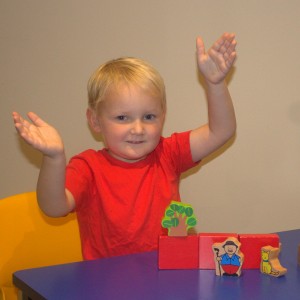 1. Mini worlds. Cheap plastic sets can be bought in shops. You can build a farm, jungle, zoo or construction site or make a prehistoric world with dinosaurs. You can add blocks, or lego and mix a couple of sets together such as animals and vehicles to extend the play.
1. Mini worlds. Cheap plastic sets can be bought in shops. You can build a farm, jungle, zoo or construction site or make a prehistoric world with dinosaurs. You can add blocks, or lego and mix a couple of sets together such as animals and vehicles to extend the play.
2. Books can provide the inspiration for all kinds of pretending. Non-fiction books can expand your child's understanding of a topic which they can then use as a theme for play. Stories can be acted out. You can also use your books for a pretend library.
3. Occupations can be the basis of all kinds of pretending. Your child can be a doctor, nurse, vet, postman, shop keeper, hair dresser, teacher, librarian, astronaut, fireman, or more.
4. Puppets can be bought cheaply or you can make your own out of socks or paperbags. You could make the characters from your child's favourite book or some characters to go with a theme.
5. Fantasy themes are lots of fun. You can use fairies, dragons, witches and knight figurines. You could make a mini world for them with playdough or make a mini garden in a container. You could make your own figurines out of cardboard rolls or make dressups and masks out of cardboard.
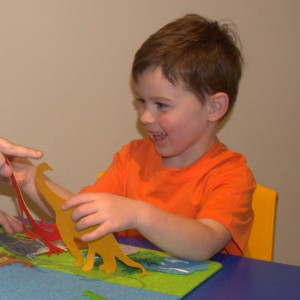 6. Dinosaurs are always popular. If you have a set of plastic dinosaurs why not make them a prehistoric world with rocks and sticks from the garden. For inside play use a playdough base on a baking tray with pop sticks, smooth stones and plastic plants.
6. Dinosaurs are always popular. If you have a set of plastic dinosaurs why not make them a prehistoric world with rocks and sticks from the garden. For inside play use a playdough base on a baking tray with pop sticks, smooth stones and plastic plants.
7. Sea themes are lots of fun. Lay out a towel on the floor and pretend to go to the beach or put on your swimming goggles and pretend to be under the sea. Use a cardboard box as a boat and go fishing. You can make paper fish add paperclips and catch them with a magnetic "fishing rod".
8. Everyone loves pirates. Make a hat, eye patch and sword. Collect items such as stuffed parrots, pirate hats, flag (old pillowcase), boxes for treasure, maps, a telescope (cardboard tube covered with foil), jewelry and plastic (or chocolate) coins for treasure.
9. Face painting can be a way to inspire your child to act out characters. You can get cheap sets of face paint in craft shops and ideas for patterns in the library or online. Let your child look at themselves in the mirror and act out their character. Take some photos or video.
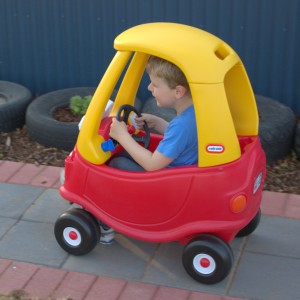 10. Cop and robbers, superheroes and emergency workers. Kids love to save the world from the bad guys. Some simple props such as a cape (or pillowcase) and a mask are all that are needed. Don't tie things around your child's neck; it is safer to attach a cape to their shirt with some pegs or clips. These are great games to play outside or at the playground as there can be lots of running, climbing and chasing involved.
10. Cop and robbers, superheroes and emergency workers. Kids love to save the world from the bad guys. Some simple props such as a cape (or pillowcase) and a mask are all that are needed. Don't tie things around your child's neck; it is safer to attach a cape to their shirt with some pegs or clips. These are great games to play outside or at the playground as there can be lots of running, climbing and chasing involved.
If you are concerned about your child's development including play skils, communication skills, social skills or learning check our website to see how Talking Matters may be able to help. For more ideas and resources check the resources section on our website and our extensive Pinterest page. Like us on Facebook and follow us on Twitter so you don't miss out on what's happening.
Related Blog Posts
If you liked this post you may also like:
Top Toddler Xmas toys
Weighted products
Developing grammar
10 ways to use puppets



